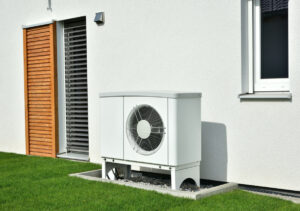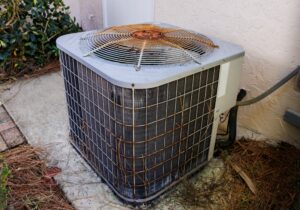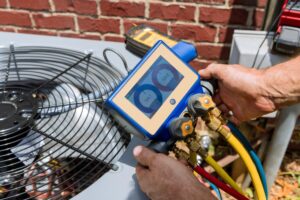As an industry leader in heating and cooling solutions, H.J. Faust is committed to helping our customers make informed decisions about their home comfort systems. One of the most common questions we get asked is about furnaces versus heat pumps. Both are popular options, but which one is right for you? To answer this question, let’s delve into the key differences, pros, and cons of each system. Once we discuss the differences between these two heating systems, call us for a free consultation or to schedule an installation.
Understanding Furnaces
A furnace is a type of heating system that generates heat to warm your home. It works by combusting a fuel source — typically natural gas or propane — which produces heat. This heat is then circulated throughout your home using a network of ducts and vents, ensuring every room is comfortably warm.
Different Types of Furnaces
Furnaces can be classified into different types based on their fuel source and how they distribute heat. Let’s explore some of the most common ones:
Gas Furnaces
The most common type of furnace in many parts of the world — a gas furnace — uses natural gas as its primary fuel source. These heaters are known for their efficiency and ability to generate a significant amount of heat, making them ideal for colder climates.
Oil Furnaces
In areas where natural gas isn’t readily available, oil furnaces are a popular alternative. These furnaces use heating oil, which is stored in a tank and burned to produce heat. While they can generate a lot of heat, they’re generally less efficient than gas furnaces and require more regular maintenance.
Electric Furnaces
Electric furnaces use electric resistance heating elements to generate heat. They’re often smaller and quieter than other types of furnaces, and they can be a good option for homes in milder climates where intense heat isn’t as necessary. However, they can be more expensive to operate due to the cost of electricity.
Propane Furnaces
Propane furnaces are another option for homes without access to natural gas. They work similarly to gas furnaces but use propane as a fuel source. While propane is typically more expensive than natural gas, these furnaces can still be a cost-effective choice in certain situations.
Each type of furnace has its own set of benefits and drawbacks, and the best choice for you will depend on factors like your location, home size, and personal preferences.
What Is a Heat Pump?
In contrast to a furnace, a heat pump system operates through the principle of heat transfer rather than generating heat internally. It functions in a similar way to your refrigerator, which removes heat from the inside and releases it outside. With a heat pump, however, this process is reversed. During winter, it extracts heat from the surrounding outdoor air and efficiently transfers it indoors. Even in colder climates, a heat pump remains effective because there is always a certain amount of heat present in the air, even if the temperature feels chilly to us. This innovative technology maximizes comfort while minimizing energy consumption, making it a sustainable and cost-effective heating solution for residential and commercial buildings alike.
Types of Heat Pumps
When it comes to heat pumps, it’s important to note that there are different types available based on their heat source. An air source heat pump, for instance, extracts heat from the outdoor air, utilizing it to warm up your space. On the other hand, a ground source heat pump, also known as a geothermal heat pump, harnesses the natural heat stored beneath the earth’s surface to provide heating.
Both options have their own unique benefits and considerations. An air source heat pump is generally more accessible and easier to install, while a ground source heat pump offers increased energy efficiency and can also be used for cooling purposes. By understanding the distinctions between these heat pump types, you can make a more informed decision on which one suits your specific needs and preferences.
Energy Efficiency: Heat Pump vs. Furnace
Heat pumps are generally more energy efficient than furnaces because they simply move heat rather than create it. However, efficiency can vary depending on your location and the specific model of the heat pump or furnace.
Cost Considerations
In terms of cost, an electric furnace might have a lower upfront cost than a heat pump. But remember, the choice between a heat pump vs. a furnace isn’t just about the initial cost. You also need to take into account the running costs. Since heat pumps are more energy efficient, they can often be cheaper to run in the long term.
The Best of Both Worlds: Dual Fuel Systems
For those living in regions with extreme temperatures, a dual-fuel heating system may be worth considering. This combines a gas furnace with a heat pump, allowing you to switch between the two depending on the weather. In mild weather, the heat pump can efficiently heat your home. But when the temperature drops below freezing, the system can switch to the gas furnace for more powerful heating.
Which Heating System Is Right For You?
So, what’s the verdict in the battle of heat pumps vs. furnaces? The answer really depends on your specific needs and circumstances. If energy efficiency is your top priority, a heat pump could be your best bet. However, if you live in a very cold climate and want a system that can provide powerful heating no matter the weather, a gas furnace might be a better choice.
At H.J. Faust, we’re here to help you navigate these decisions and ensure you have a heating system that keeps you comfortable all year round. Whether you choose a heat pump or a furnace, our heating services ensure it is properly installed and maintained. Contact us today and speak to one of our knowledgeable staff members who can answer any questions you may have and help you book an appointment.



